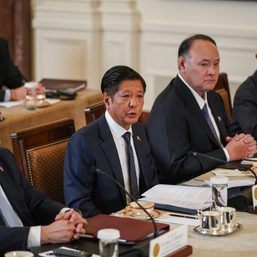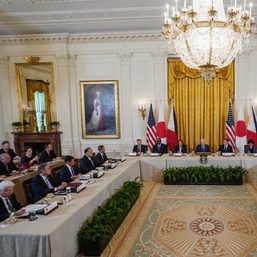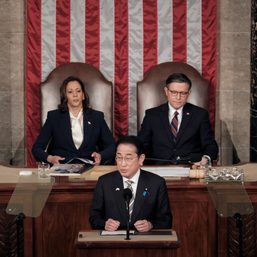SUMMARY
This is AI generated summarization, which may have errors. For context, always refer to the full article.

On Monday, July 20, video distribution platform Pravi is set to release Bloody Monday Season 2, the popular Japanese TV series from 2010 that starred Haruma Miura as Fujimaru Takagi, the white hat hacker out to save Japan and the world from a terrorist organization.
The lead actor won’t see for himself, though, if the reissue will be as well-received as Season 1 (from 2008), which was released recently. Miura-san was found dead in his home in Tokyo past noon on Saturday, July 18.
It was an apparent suicide. He left a note. He was 30.
I learned of the news quickly enough, even before local sites carried it. My children – young people whose introduction to Japanese drama included some of Miura-san’s early works – told me. With discernible sadness.
This is why I’m writing to parents and any elders whose wards happen to be those high school and college students, maybe even young adults, who made “Haruma Miura” and “Rest in Peace” trend on Twitter in the Philippines on the day of the actor’s death. You may want to speak – and listen – to them about it. About him.
His fans are both girls and boys, and, judging from how they’ve been pouring out their hearts on SNS, they admired him not just for his good looks or his music or whatever was trendy about him as a celebrity. In their emotionally tumultuous teenage years, they shared the loves, the self-doubts, the despair, the hopes of the characters he portrayed.
Miura-san is, to them, many persons. Among them:
- Hiro, the high school boy who breaks up with his girlfriend to spare her the pain of his expected death from cancer (Koizora or Sky of Love, 2007).
- Yusuke Iki, the talented marathon runner, whose race for gold is complicated by his ability to forgive his manager who caused his father’s death years earlier (Naoko, 2008).
- Ren Kazama, who heads one side of warring factions in a class, which later band together to stand up to a common enemy, even as they deal with their personal and family issues (Gokusen Season 3, 2008; aired in the Philippines on GMA TV in 2009).
- Mochizuki Kotaro, the otherwise timid boy who musters courage after he becomes fascinated with the story of a heroic general from 400 years ago, and as he discovers that he himself is a descendant of a powerful samurai (Samurai High School, 2009).
Talent gone too soon
In the conversation in our home, we tried to understand where the youngsters’ glumness was coming from. It was necessarily nostalgia, remembering that, from the opposite sides of the screen, they and Miura-san’s characters grew up together.
But since they are also old enough now to be able separate the actor from the roles he played, it seemed to me they were also trying to reconcile how somebody, whom they thought still had so much to offer, might have believed otherwise about himself.
How could such a talent be gone too soon?
Nobody can claim to have the answer to questions like this, so I said, maybe let’s just remember him for how he gave life to those characters. Each of those lives at least stays. That’s the best way to honor the memory of someone you’ve “known.”
I was sure the kids knew that was what anybody raised in J-drama and J-pop should do, but I thought they still needed to hear it. To know, that somebody heard, if not understood, this part of them.
Mommy, in fact, was a belated fan, I admitted to them. Over Miura-san’s 23 years in the entertainment industry, the actor did 26 films, 30 TV series, 5 music videos, and 6 theater productions. I had missed him in those drama that they grew up watching, and only noticed the breadth of talent and the depth of performance he had increasingly displayed in his adult years. I had been going back to his movies and TV series from recent years after I learned that he, who was stuck in my consciousness as a child actor and matinee idol, had ventured into theater.
When, among many actors his age, he was the one tapped to play Tomohiko Doi (the equivalent of Tommy) in a TV adaptation of Nobel Prize winner Kazuo Ishiguro’s Never Let Me Go (Watashi wo Hanasanaide), I thought it was something. In his role as the ALS-stricken college student in The Hours of My Life, he conveyed a range of emotions just with his eyes. Even more powerful was his Daichi, a man wrongly jailed for murder at a time when he had to save his daughter who was dying from leukemia, in the drama series Two Weeks, for which he also performed the theme song “Fight for Your Heart. I could go on.
On stage, he was Val Xavier in Orpheus Descending (Jigoku no Orpheus) and The Man in an adaptation of Andrew Lloyd Webber’s Whistle Down the Wind. He had been cast in The Illusionist musical, which was supposed to run this December. The loss fully hit me on the night of his death when I replayed videos of his performance as the drag queen Lola in Kinky Boots.
So I told my children: when you’re older or when you’re ready for them, you will have to see Miura-san’s latter works. Be a witness to how he matured as an artist. His craft is not something to be missed. That, again, is the best way to honor his memory.
Ask, talk, reach out
Our conversation then turned personal in the sense that the children thought about how his other celebrity friends, whom fans like them also know, received the news. They must be devastated. He’s living alone, right? Do you think any of his friends called him recently? Did they know he was sad? Are they thinking what they could’ve done if they knew he needed help? Wasn’t he the “H” among the friends supposedly represented in the title of One OK Rock’s “C.h.a.o.s.m.y.t.h.”? We wonder how his family is coping?
Before writing this blog, I checked Haruma Miura’s official Instagram account (he apparently had a private, personal one), wondering if the young man gave any hint of what he was going through. In his first post, on the first day of the year, he said “Happy New Year!” with a promise to “continue to work harder.” He posted a video of him riding a horse.
The emoji of a horse would appear in a few more of his 52 posts – apparently, the characters for his first name translate as “spring” (春 haru) “horse” (馬 uma). He wasn’t like most celebrities who posted random selfies or silly poses. He would occasionally announce a project, or a message about climate change, and then mostly the “boys’ meals” he had whipped up from leftover food, while urging followers to, even using the hashtag popular in Japan, #StayHome during the coronavirus emergency.
He didn’t just say, this is what I’m eating today; he’d say, this is how I prepared this, and these are the nutrients you can get from a preparation like this. He had kimchi, sukiyaki, pumpkin croquette, tofu spring rolls. He seemed a responsible man.
When he turned 30 last April 5, he posted a closeup shot of his carpet – the one thing in front of him at that moment, he said – and vowed to give his best in what does. “I’m still an inexperienced person, but I look forward to your continued support,” he said in Japanese. The note ended with the emoji of a horse.
On June 5, when his IG followers reached 1 million (there were 1.3 million, as of posting), he posted a video to thank his fans, and wrote a note in Japanese, “May everyone be physically and mentally healthy! #Thanks”
The mother that I was, you could trust that I instinctively steered the talk closer to home on Saturday. Do we have friends whom we should be checking on? Do we remember them in prayer? Are families we know coping well during the lockdown? Do we know anybody who’s living alone? Does any of us feel alone sometimes? Tell me, tell us. Reach out. – Rappler.com
Postscript:
I originally wrote that Miura-san’s official IG account seemed “fairly new.” His fans who responded to this blog pointed out, with screenshots as proof, that he had it for some time, but that he deleted posts at the end of each year. What a symbolism, I thought – leaving the past behind and looking ahead when a new year comes.
Remember when my children were worried about how Miura-san’s closest celebrity friends took the news? They constantly checked social media for updates, and seemed comforted when One OK Rock’s Taka posted his tribute 4 days later, on July 22, and actor Shohei Miura did the same on July 25. I told them the NHK reported that those friends, including actor Takeru Satoh, were able to pay their last respects at Miura-san’s funeral.
To the non-fans (yet), if you’re curious about the talent I’ve been effusive about in this blog, watch Miura-san’s posthumously-released work, the video of his second single, “Night Diver.” There were at least 3 other projects he completed before he passed away: the movie and TV series Gift of Fire, about a research to build an atomic bomb in the waning years of World War II; and the romance comedy titled Okane no Kireme ga Koi no Hajimari (The End of Money is the Start of Love). An Indonesia-based YouTube channel, Dzikri N Asa, put together “The Evolution of Haruma Miura (1997-2020),” capturing some of Miura-san’s best moments as an actor.
I hope these stories from Rappler can help us help our loved ones:
- PODCAST: Battling depression and anxiety
- A cry for help: Mental illness, suicide cases rising among youth
- How not to speak to a suicidal person
- SUICIDE: A note to every Filipino
- On World Suicide Prevention Day, learn how to save lives
- How to spot suicidal tendencies in your loved ones
- The whys of suicide
The Department of Health has a national crisis hotline to assist people with mental health concerns. The hotline can be reached at 1553 (landline); 0966-351-4518 and 0917-899-USAP (8727) (Globe/TM); and 0908-639-2672 (Smart/Sun/TNT). For regional helplines, click here.
Add a comment
How does this make you feel?






There are no comments yet. Add your comment to start the conversation.